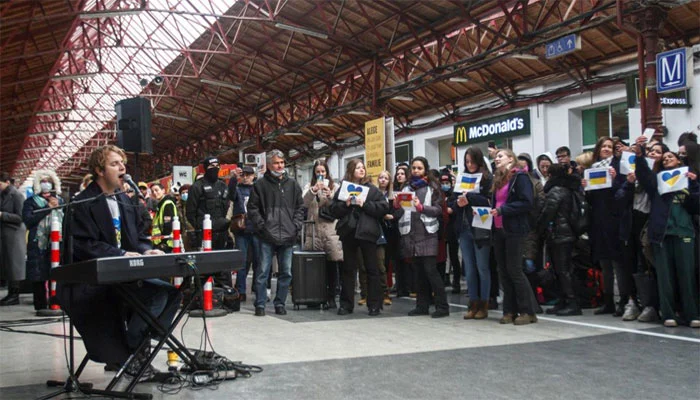During a video address to the House of Commons by Ukrainian President Volodymyr Zelenskyy on Wednesday, British politicians applauded as Zelenskyy, dressed in army khakis, invoked Winston Churchill’s wartime rhetoric and urged the UK to increase military and humanitarian aid to Ukraine.
While the UK was quick to arm Ukraine, sending thousands of anti-tank missiles as early as January, and to support sweeping economic sanctions on Russia – now even targeting resident oligarch Roman Abramovich – it has not given Ukrainian refugees the open-armed welcome they have received elsewhere in the EU.
Instead, displaced Ukrainians have complained about endless red tape and delays when applying for visas, which sometimes require them to wait weeks or travel hundreds of kilometres to centres in Ukraine or neighbouring countries to submit biometric data.
The UK has indicated that it will not grant Ukrainians refugee status, but has promised to expedite family reunification.
Priti Patel, the UK Home Secretary, announced on Tuesday that applicants with Ukrainian passports will be able to apply online rather than in person, but the UK scheme will still be limited to those who already have family in the country where they wish to reunite.
Only about 1,000 visas have been issued thus far.
“It’s an emergency situation, and EU countries have waived visa requirements,” Al Jazeera’s Colin Yeo, an immigration and asylum lawyer, said. “It’s difficult to see why the UK believes it is unique in that regard.”
According to the UN refugee agency, 2.6 million Ukrainians have fled the country since Russia invaded it in late February. It is estimated that if Russia’s military offensive, which has included widespread bombing of civilian areas, continues, the figure could rise to 4 million.
The EU unanimously activated its Temporary Protection Directive on March 3, granting Ukrainians the right to work, live, and receive healthcare in EU member states for one to three years.
The UK’s lack of urgency in assisting Ukrainians has not gone unnoticed by its European allies, with French President Emmanuel Macron chastising the country following an emergency EU summit on Friday.
“Despite all the grand statements… the British government continued to apply current rules, which meant they did not welcome Ukrainian refugees seeking to enter Britain,” Macron said.
The government’s hardline stance has also enraged many domestically, where polls show that a large majority of the public supports admitting a large number of Ukrainians as soon as possible.
The UK’s refugee policy has been described as “shameful” by the Financial Times, and several refugee charities have criticised the government’s plans as vague and insufficient.
Ukrainian Ambassador Vadym Prystaiko stated in a session of the Home Affairs Committee on Wednesday that while Britons have been able to enter Ukraine without a visa since 2005, the arrangement has never been reciprocal, which has left many Ukrainians irritated.
He claimed that his wife encountered “bureaucratic hiccups” in obtaining a visa prior to the war.
“A number of them have travelled to Poland to assist their family members with the visa application process.”
Terlecky hopes that the online applications will alleviate some of the problems, but he is concerned that the number of people trying to reach the UK will increase now that Russian bombing raids have reached previously safe cities like Dnipro in central Ukraine.
Russia conducted air raids on a military base near the western city of Lviv on Sunday as part of an expansion of its military operation.
On Sunday, the government announced the “Homes for Ukraine” sponsorship scheme, under which the government will pay individuals or charities 350 pounds ($456) per month to host an uncapped number of Ukrainian nationals for at least six months, aimed at those with no existing family ties to the UK.
It is unclear what legal status people will be granted under this scheme, but experts told Al Jazeera that it is unlikely to be full refugee status. Hosts will have to be vetted, adding layers of bureaucracy that will likely slow the rate at which Ukrainians can be admitted.




















